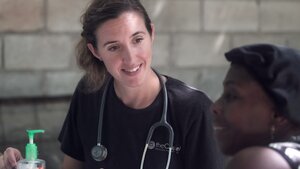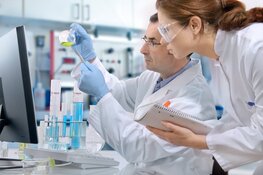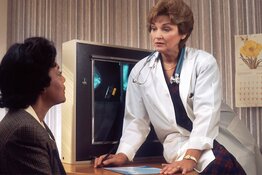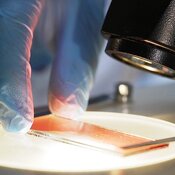Sernova Corp. (SVA:TSX.V; SEOVF:OTCQB; PSH:XERTA) should benefit from Sana Biotechnology's recent prioritization of its diabetes-targeted cell therapy programs, reported Leede Financial Inc. analyst Dr. Douglas Loe in a Nov. 6 research note. Now Sana's clinical programs in oncology and Huntington's disease are a secondary focus.
"Our model assumes that Sernova's cell reservoir device Cell Pouch will itself remain focused on type 1 diabetes, and we are thus encouraged to see a U.S. peer prioritize its pipeline in ways that are consistent with our own views on how priorities in regenerative medicine will evolve in coming years," Loe wrote.
500% potential return
Leede has a $1.50 per share target price on Sernova, now trading at about $0.25 per share, noted Loe.
"At current price levels, our price target corresponds to a one-year return of 500%, a return that we believe is imminently achievable by 2025E but likely with a milestone driven, and not a linear, trajectory," the analyst wrote.
The company is a Speculative Buy.
Synergistic potential exists
Loe highlighted that Sernova and Sana could benefit from aligning their programs, on a timeline providing synergies to both.
"We are encouraged to see a leading regenerative firm choose to expedite its diabetes cell therapy program in preference to other initiatives that it could fund if it chose to," Loe wrote. "This is consistent with our own view that the most attractive medical market for regenerative firms, and for Sernova, to target is the large and growing diabetes market both for economic and technical reasons."
Sana's diabetes programs
Sana's primary focus is its program to treat type 1 diabetes with its Phase 1-stage, hypo-immune platform (HIP)-modified primary pancreatic islet cell therapy UP421 and its preclinical HIP-modified, stem cell-derived pancreatic islet platform SC451.
Through this platform, regenerative cell therapies can be modified genetically to evade immune detection post implantation. This is achieved by reducing expression of major histocompatibility-complex, classes one and two human leukocyte antigens while increasing expression of CD24. This is a surface protein found on stem cells in the pancreas.
Sernova's cell reservoir platform
As for Sernova, it has a well-vascularized, sustainably functioning cell reservoir platform, Cell Pouch, proven for some time. Development of regenerative islet platform technology now is catching up. Sernova has a clinical trial underway that combines the two technologies. This Phase 1 trial in diabetes, in partnership with the University of Chicago, already has shown "impressive long-term insulin independence data," up to five years in some study participants.
This is "well beyond what we believe is a reasonable threshold for the U.S. Food and Drug Administration to require for future Cell Pouch approval, at least for type 1 diabetes," Loe wrote.
Currently, with regard to this program, Sernova optimizing background immunosuppression in Cell Pouch patients. Details of its new immunosuppressive regimen are expected in the biotech's next Phase 1 study update, likely in early H1/25.
"Future enrollees could be subjected to novel immunosuppressive therapies that conceivably could extend islet survival and perhaps even reduce the immunosuppressive burden that transplant patients must endure at present," Loe commented.
Further, Sernova is considering conducting a Phase 1 study using its Cell Pouch and Evotec AG's stem-cell-derived iBeta platform to treat diabetes. Before this can happen, though, Evotec needs to be able to produce iBeta at a clinical scale, which Loe expects can happen by H2/25.
"We see no reason why Sana and its UP421/SC451 modified islet platforms could not be incorporated into a Cell Pouch environment as a way to sustain their therapeutic half-life in the body post implantation," wrote Loe.
Possible stock price movers
Loe provided a handful of potential catalysts for Sernova's share price. They are:
1) Sernova's conclusion of its ongoing Phase 1 study in type 1 diabetes with the University of Chicago, which Loe asserted should happen a quickly as possible given available capital. Also, the biotech should incorporate into this trial or a separate one to commence soon after, regeneratively produced pancreatic islets.
2) Sernova, in partnership with Sana, launching a Phase 1 iBeta/Cell Pouch trial late next year, which could boost Sernova's share price.
3) Sernova identifying additional developers of regenerative cell therapies with which it could combine Cell Pouch in mutually beneficial ways.
4) Sernova starting clinical programs in hemophilia A and in thyroid disease, expected to happen in the coming quarters.
5) Sernova incorporating its confocal cell coating technology into one or more future protocols for stem cell-derived pancreatic islet production, even its current Phase 1 diabetes trial with the University of Chicago. Before this can happen, however, coating polymer composition and manufacturing methodologies must be honed to meet good manufacturing practices specifications.
| Want to be the first to know about interesting Medical Devices investment ideas? Sign up to receive the FREE Streetwise Reports' newsletter. | Subscribe |









































